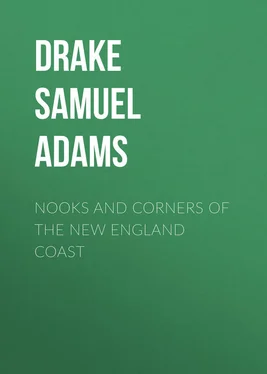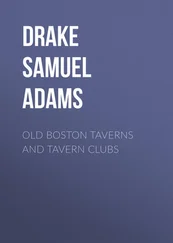Samuel Drake - Nooks and Corners of the New England Coast
Здесь есть возможность читать онлайн «Samuel Drake - Nooks and Corners of the New England Coast» — ознакомительный отрывок электронной книги совершенно бесплатно, а после прочтения отрывка купить полную версию. В некоторых случаях можно слушать аудио, скачать через торрент в формате fb2 и присутствует краткое содержание. Жанр: foreign_antique, foreign_prose, на английском языке. Описание произведения, (предисловие) а так же отзывы посетителей доступны на портале библиотеки ЛибКат.
- Название:Nooks and Corners of the New England Coast
- Автор:
- Жанр:
- Год:неизвестен
- ISBN:нет данных
- Рейтинг книги:3 / 5. Голосов: 1
-
Избранное:Добавить в избранное
- Отзывы:
-
Ваша оценка:
- 60
- 1
- 2
- 3
- 4
- 5
Nooks and Corners of the New England Coast: краткое содержание, описание и аннотация
Предлагаем к чтению аннотацию, описание, краткое содержание или предисловие (зависит от того, что написал сам автор книги «Nooks and Corners of the New England Coast»). Если вы не нашли необходимую информацию о книге — напишите в комментариях, мы постараемся отыскать её.
Nooks and Corners of the New England Coast — читать онлайн ознакомительный отрывок
Ниже представлен текст книги, разбитый по страницам. Система сохранения места последней прочитанной страницы, позволяет с удобством читать онлайн бесплатно книгу «Nooks and Corners of the New England Coast», без необходимости каждый раз заново искать на чём Вы остановились. Поставьте закладку, и сможете в любой момент перейти на страницу, на которой закончили чтение.
Интервал:
Закладка:
The beach is much frequented after a storm by crows in quest of a dinner al fresco . They haunt it as persistently as do the wreckers, and seldom fail of finding a stranded fish, a crab, or a mussel. They are the self-appointed scavengers of the strand, removing much of the offal cast up by the sea. The crow is a crafty fellow, and knows a thing or two, as I have had reason to observe. The large sea-mussel is much affected by him, and when found is at once pounced upon. Taking it in his talons, the crow flies to the nearest ledge of rocks, and, calculating his distance with mathematical eye, lets his prize fall. Of course the mussel is dashed in pieces, and the crow proceeds to make a frugal meal. I have seen this operation frequently repeated, and have as often scared the bird from his repast to convince myself of his success.
His method of taking the clam is equally ingenious. He walks upon the clam-bank at low tide, and seizes upon the first unlucky head he finds protruding from the shell. Then ensues a series of laughable efforts on the crow's part to rise with his prey, while the clam tries in vain to draw in its head. The crow, after many sharp tugs and much flapping of his wings, finally secures the clam, and disposes of him as he would of a mussel. The Indians, whose chief dependence in summer was upon shell-fish, complained that the English swine watched the receding tide as their women were accustomed to do, feeding on the clams they turned up with their snouts.
In the olden time the beach was the high-road over which the settlers traveled when, as was long the case, it was their only way of safety. It was often beset with danger; so much so that tradition says the mail from Portsmouth to Wells was for seven years brought by a dog, the pouch being attached to his collar. This faithful messenger was at last killed by the savages. For miles around this bay the long-abandoned King's Highway may be traced where it hugged the verge of the shore, climbing the roughest ledges, or crossing from one beach to another by a strip of shingle. Here and there an old cellar remains to identify its course and tell of the stern lives those pioneers led.
When the tide is out, I also keep at low-water mark, scrambling over ledges, or delving among the crannies for specimens. It does not take long to fill your pockets with many-hued pebbles of quartz, jasper, or porphyry that, in going a few rods farther, you are sure to reject for others more brilliant. At full sea I walk along the shore, where, from between those envious little stone walls, I can still survey the Unchanged.
After all that has been printed since the "Tractatus Petri Hispani," it is a question whether there are not as many popular superstitions to-day among plain New England country-folk as at any time since the settlement of the country. The belief in the virtue of a horseshoe is unabated. At York I saw one nailed to the end of a coaster's bowsprit. To spill salt, break a looking-glass, or dream of a white horse, are still regarded as of sinister augury. A tooth-pick made from a splinter of a tree that has been struck by lightning is a sure preventive of the toothache. Exceeding all these, however, is the generally accepted superstition that has led to the practice of bathing on Saco Beach on the 26th of June in each year. On this day, it is religiously believed that the waters, like Siloam of old, have miraculous power of healing all diseases with which humanity is afflicted. The people flock to the beach from all the country round, in every description of vehicle, to dip in the enchanted tide. A similar belief existed with regard to a medicinal spring on the River Dee, in Scotland, called Januarich Wells, one author gravely asserting that so great was the faith in its efficacy that those afflicted with broken legs have gone there for restoration of the limb.
I have found it always impracticable to argue with the pilgrims as to the grounds of their belief. They are ready to recount any number of wonderful cures at too great a distance for my investigation to reach, and may not, therefore, be gainsaid. It is a custom.
All this time I was nearing Ogunquit, a little fishing village spliced to the outskirts of Wells, being itself within the limits of York. At my right I caught a glimpse of the green bulk of Mount Agamenticus, and on the other hand, almost at my elbow, was the sea. So we marched on, as it were, arm in arm; for I was beginning to feel pretty well acquainted with a companion that kept thus constantly at my side. This morning it was Prussian blue, which it presently put off for a warmer hue. There it lay, sunning itself, cool, silent, impenetrable, like a great blue turquoise on the bare bosom of Mother Earth, nor looking as if a little ruffling of its surface could put it in such a towering passion.
My sachel always contains a luncheon, a book, and a telescopic drinking-cup. At noon, having left eight miles of road behind me, I sought the shelter of a tree by the roadside, and found my appetite by no means impaired by the jaunt. At such a time I read, like Rousseau, while eating, in default of a tête-à-tête. I alternately devour a page and a piece. While under my tree, a cow came to partake of the shade, of which there was enough for both of us. She gazed at me with a calm, but, as I conceived also, a puzzled look, ruminating meanwhile, or stretching out her head and snuffing the air within a foot of my hand. Perhaps she was wondering whether I had two stomachs, and a tail to brush off the flies.
From the village of Ogunquit there are two roads. I chose the one which kept the shore, in order to take in my way Bald Head Cliff, a natural curiosity well worth going some distance to see. The road so winds across the rocky waste on which the village is in part built that in some places you almost double on your own footsteps. Occasionally a narrow lane issues from among the ledges, tumbling rather than descending to some little cove, where you catch a glimpse of brown-roofed cottages and a fishing-boat or two, snugly moored. The inhabitants say there is not enough soil in Ogunquit with which to repair the roads, a statement no one who tries it with a vehicle will be inclined to dispute. Literally the houses are built upon rocks, incrusted with yellow lichens in room of grass. Wherever a dip occurs through which a little patch of blue sea peeps out, a house is posted, and I saw a few carefully-tended garden spots among hollows of the rock in which a handful of mould had accumulated. The wintry aspect is little short of desolation: in storms, from its elevation and exposure, the place receives the full shock of the tempest, as you may see by the weather-stained appearance of the houses.
A native directed me by a short cut "how to take another ox-bow out of the road," and in a few minutes I stood on the brow of the cliff. What a sight! The eye spans twenty miles of sea horizon. Wells, with its white meeting-houses and shore hotels, was behind me. Far up in the bight of the bay Great Hill headland, Hart's and Gooch's beaches – the latter mere ribbons of white sand – gleamed in the sunlight. Kennebunkport and its ship-yards lay beneath yonder smoky cloud, with Cape Porpoise Light beyond. There, below me, looking as if it had floated off from the main, was the barren rock called the Nubble, the farthest land in this direction, with Cape Neddoek harbor in full view. All the rest was ocean. The mackerel fleet that I had seen all day – fifty sail, sixty, yes, and more – was off Boon Island, with their jibs down, the solitary gray shaft of the light-house standing grimly up among the white sails, a mile-stone of the sea.
There are very few who would be able to approach the farthest edge of the precipice called the Pulpit, and bend over its sheer face without a quickening of the pulse. As in all these grand displays in which Nature puts forth her powers, you shrink in proportion as she exalts herself. For the time being, at least, the conceit is taken out of you, and you are thoroughly put down. Here is a perpendicular wall of rock ninety feet in height (as well as I could estimate it), and about a hundred and fifty in length, with a greater than Niagara raging at its foot – a rock buttress, with its foundations deeply rooted in the earth, breasting off the Atlantic; and the massy fragments lying splintered at its base, or heaved loosely about the summit, told of many a desperate wrestling-match, with a constant gain for the old athlete. The sea is gnawing its way into the coast slowly, but as surely as the cataract is approaching the lake; and the cliff, though it may for a thousand years oppose this terrible battering, will at last, like some sea fortress, crumble before it.
Читать дальшеИнтервал:
Закладка:
Похожие книги на «Nooks and Corners of the New England Coast»
Представляем Вашему вниманию похожие книги на «Nooks and Corners of the New England Coast» списком для выбора. Мы отобрали схожую по названию и смыслу литературу в надежде предоставить читателям больше вариантов отыскать новые, интересные, ещё непрочитанные произведения.
Обсуждение, отзывы о книге «Nooks and Corners of the New England Coast» и просто собственные мнения читателей. Оставьте ваши комментарии, напишите, что Вы думаете о произведении, его смысле или главных героях. Укажите что конкретно понравилось, а что нет, и почему Вы так считаете.












